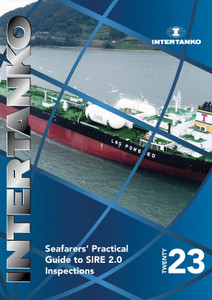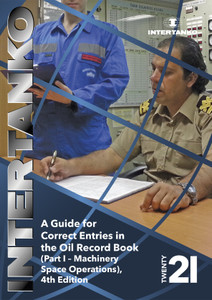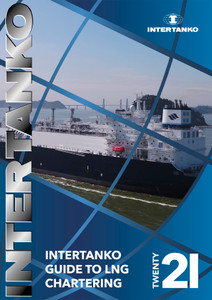
This publication, now in its 15th edition, provides guidance on ship inspections and the vetting process and is designed to assist tanker crews and personnel ashore to better understand, and to be better prepared for, vetting inspections.
This guide compiles the latest advice and requirements from energy departments, Port State authorities and INTERTANKO members, to assist with understanding ship inspections and the vetting process, and to help readers comply with vetting requirements.
It contains:
- A general introduction to Port State Control (PSC) and Regional MoUs
- detailed information on specific MoUs
- an overview of the detention appeal and review process
- a guide to vetting inspections
- specific vetting company requirements.
Appendices also provide details of IMO requirements, key INTERTANKO and OCIMF-SIRE documents and sample Report of Inspection forms.
Foreword
The tanker shipping industry is widely recognised for its ability to provide economic and efficient long-distance transportation of energy, while at the same time enjoying the lowest environmental footprint in the transport segment on a per-tonne basis.
The industry has come a long way since the first transportation of oil in bulk in 1869 - back then it was carried below deck and within iron tanks - today's global tanker fleet boasts in excess of 600 million DWT capacity. Although the hazards associated with the bulk transportation of oil and gas have remained similar over the years, the risks have been drastically reduced - however, the challenges our industry faces have increased exponentially.
The tanker industry must, and does, act proactively and effectively in mitigating the applicable risks and ensuring high-impact incidents do not occur. The industry is unique in this respect in that all stakeholders are united and aligned with a common goal of ZERO incidents. Ship operators through to charterers, terminal operators and receivers, despite being in a very competitive market, have this as a common goal and core mission objective.
A common Goal Zero has resulted in unified efforts in the improvement of safety onboard vessels. INTERTANKO, OCIMF and CDI have worked effectively in the field of risk management to produce best practice guidance and recommendations to the industry. Shipping companies must, however, effectively demonstrate such risk management as part of their company quality and safety management systems that will make them prudent and safe business partners. Vetting is the process that energy companies, terminals and charterers use to manage risk when assessing a vessel. A successful "vetting" is, therefore, a vessel?s "ticket to trade".
Vetting has progressed and matured from a process concentrating predominantly with the verification of vessel?s equipment and systems to the review of effective safety management systems - and more recently, in the assessment of soft skills and the human element. With the launch of OCIMF?s SIRE 2.0 in September 2024 there is a heightened emphasis on the effect of the human element on managing risks.
The future is decarbonisation of the shipping industry, with ambitious greenhouse gas reductions targets driving technological developments. These will introduce additional challenges with the use of new fuels and technologies and the vetting process will need to adapt to assess effective management of these potential risks.
Our industry has also faced significant challenges with the effects of the Covid-19 pandemic impacting our seafarers globally and influencing the industry in all aspects, including effective risk management. The resilience of our seafarers has ensured minimum impact on the safety of operations. Flexibility in vetting has also assisted in minimising the impact on the vetting process.
INTERTANKO plays a vital role in guiding ship operators in the vetting process by ensuring up-to-date information from stakeholders is readily available to the Membership. The Vetting Committee plays a fundamental role in monitoring the industry, analysing developments and trends, and offering the necessary tools in acquiring a successful "vetting" of their vessels.
This Guide to the Vetting Process, compiled with the assistance and support of the vetting departments of energy companies and INTERTANKO Members, brings together the up-to-date requirements of these stakeholders.
As Chair of the Vetting Committee, it is with great pride that I present this guide, which, through the hard efforts of the Committee, INTERTANKO staff and the contribution of the energy companies' vetting departments, has become the industry benchmark for all information related to tanker vetting. It is completed and supported by the "Seafarers' Practical Guide to SIRE 2.0 Inspections" - a 'must have' guide for ships' staff.
I would like to express my deepest appreciation to INTERTANKO's Vetting Committee and Secretariat for their contribution in the production and update of this publication.
Stefanos K. Stylianos
Minerva Marine Inc. / Minerva Gas Inc.
Chairman, INTERTANKO Vetting Committee
Foreword
Guide to Vetting Inspections
A Guide to Ship Inspections
OCIMF
SIRE Introduction
SIRE Documents
OCIMF-SIRE PSC Repository
Chemical Distribution Institute (CDI)
Vetting Company Requirements
ADNOC
Alma Petroli S.p.A
Ampol Shipping & Logistics Pte Ltd
Aramco Trading Company ? ATC
BASF
Borealis AG
BP Shipping Ltd
Braskem
Chevron
CITGO
ConocoPhillips
Dow Chemical
Enagás
ENAP
ENEOS Corporation
ENI Trading and Shipping S.p.A
EQUINOR
ExxonMobil
Idemitsu Ship Vetting Service
INEOS
International Energy Company (IECO) Pte Ltd
IPLOM
Koch Shipping Pte Ltd
Kuwait Petroleum Corporation
Marathon Petroleum Corporation
MISC Maritime Services SDN BHD (MMS)
Moeve
Motor Oil (Hellas) S.A.
Neste Corporation
OMV
Petrobras ? Petroleo Brasileiro S/A
Phillips 66
P.M.I. Trading DAC
Preem AB
PTT Marine Group
QatarEnergy
REPSOL Trading S.A.
RightShip
SABIC
SARAS
SGS Nederland BV: Marine & Ship Vetting Services
SHELL International Trading and Shipping Company Ltd (STASCO)
ShipVet Services Ltd
ShipVetting B.V.
Sonangol Shipping
TotalEnergies Activités Maritimes
Turkish Petroleum Refineries Corporation (TUPRAS)
UNIPEC
YPF S.A.
Appendices
Related Vetting Information
Newbuilding Table
Energy Companies CAP Matrix Table
Officers Matrix Requirements
INTERTANKO Benchmarking and Performance Monitoring Tools
INTERTANKO Vessel & PSC Inspection Feedback Systems
Terminal Vetting Database
Tanker Management and Self Assessment (TMSA 3)
INTERTANKO Tanker Chartering Questionnaire 88
Q88.COM
OCIMF-SIRE Inspection Request Form Requirement, Singapore
OCIMF-SIRE Vessel Incident Repository (VIR)
Guide to Port State Control and Regional MoUs
Introduction, Scope and Background to PSC
Port State Control Inspections
Professional Qualifications and Conduct of PSCOs
Deficiencies and Detentions
General Guide for Masters
A Guide for Masters ? US Coast Guard Visits
Guidance for Companies
Selection of Ships for Port State Control
Port State Control and Regional MoUs
Port State Control - Abuja MoU
Port State Control - Black Sea MoU
Port State Control - Caribbean MoU
Port State Control - Indian Ocean MoU
Port State Control - Mediterranean MoU
Port State Control - Paris MoU
Port State Control - Riyadh MoU
Port State Control - Tokyo MoU
Port State Control - Viña del Mar MoU
Port State Control Inspections in Australia
Port State Control Inspections in China
Port State Control Inspections in the United Kingdom
Port State Control Inspection in the USA
Code of Good Practice for Port State Control Officers
Detention Appeal and Review Procedures
Abuja MoU Detention Review Panel Procedures
Black Sea MoU Detention Review Panel Procedures
China Detention Review Panel Procedures
Indian Ocean MoU Independent Detention Review Panel
Mediterranean MoU Review Panel/Appeal Procedures
Paris MoU Detention Review Panel Procedure
Tokyo MoU Detention Review Panel Procedure
United Kingdom Detention Review Procedures
Viña del Mar MoU Detention Review Panel Procedures
Generic Appeal Letter for USCG Interventions
Related Port State Control Information
INTERTANKO Vessel & PSC Inspection Feedback Systems
EQUASIS
Procedures for Port State Control, 2023
PSC Codes for Deficiencies / Detention
Port State Control and Regional MoUs
Report of Inspection in Accordance with IMO Port State Control Procedures (Form A)*
Report of Inspection in Accordance with IMO Port State Control Procedures (Form B)
INTERTANKO (the International Association of Independent Tanker Owners) is a trade association that has served as the voice for independent tanker owners since 1970, representing the interests of its Members at national, regional and international levels.
The organisation champions an industry dedicated to support global energy networks by delivering safe, efficient and environmentally sound transport services.
INTERTANKO actively works on a wide range of operational, technical, legal and commercial issues affecting tanker owners and operators around the world. It draws on regular and direct contact with its Members and other industry stakeholders to develop and disseminate information and best practice, essential to the tanker industry.
- Number of Pages:
- 458
- Published Date:
- May 2025
- Publication Date:
- May 2025
- Book Height:
- 305 mm
- Book Width:
- 255 mm
- Weight:
- 2 kg
- Author:
- INTERTANKO
- Preview:
- Yes






